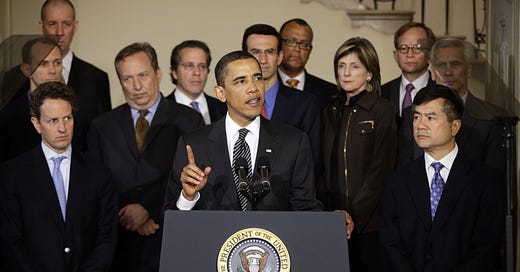Executive Delegation: Rise of the Czars
America was founded on the doctrine of laissez-faire government. The Founding Fathers recognized man’s presupposed inherent sovereign rights; formally housing them under the protections of a static Constitution. Whilst George Washington’s two terms in office set a lasting precedent, defining righteous executive leadership; the prospect of glory has swayed contemporary presidents. American Presidents have imposed congressionally earmarked initiatives, sweeping executive orders, and executed poor judgment to unsuccessfully resolve crises. Worse, executive czars have defiantly persisted with every succeeding administration, clashing with Congress and the president’s appointed department secretaries.
Former U.S. President Barack Obama’s Patient Protection and Affordable Care Act (ACA), attempted to us law-on-the-books to solve America’s health care crisis. But Obama’s eagerness and willingness to forge a pathway to extolment soon became apparent—the U.S. president overtly rejected America’s elected representatives and Senators, bypassing their dissent, through persuasive congressional incentivization. Obama’s use of executive powers to bargain against the morality of Congress throughout his administration, brings question to the outcome objectives of his executive actions. Instead, it is evident Obama deliberately interpreted his executive powers as a pretext to achieve his own goal; ratify Obamacare.
Autonomous Obamacare
In practice, Obamacare failed to achieve its claimed objective. Rather than solving America’s health care crisis, Obamacare made the healthcare system even worse. Between the cost of insurance pools, risk selection, and adverse selection, the Affordable Care Act has become a national disaster. For the minority of individuals who qualify, the quality of ACA care and time spent with each doctor is inferior to patients with private insurance.
The Affordable Care Act’s “Obamacare” name instead left a lasting legacy; Obama had kept his word, and revolutionized healthcare; in a manner unfavorable to the majority of Americans. The highest beneficiary from the executive action was the sitting president himself. But he did not achieve this executive action without the support of a reluctant Congress.
Congressional Quid Pro Quo
The president’s bargaining with congress neglects civic representation in that the initial disposition is reflective of the congressional district’s expectations of their elected Representative or Senator. Obama’s push for Congress to pass the Affordable Care Act diluted diplomacy between the executive branch and the legislature.
Conversely, Obama’s behavior expanded beyond politics to the extent he received bipartisan criticism from Congress. The abuse of executive power is nothing new. Obama’s despotic actions represent a persistent erosion of the Framers’ Constitutional principles. The result of sequential presidents’ monarchal actions has been the attrition of the civic union that America’s Founding Fathers fought to establish; “the archetype of White House czars is the position of National Security Advisor, who controls the National Security Council (NSC) staff,” (Pfiffner, J., p. 90).
The Appointment of Executive Czars
Obama directed his White House czars to operate independently of his cabinet secretaries; thus, his “newly created czars were likely to find their authority questioned by jealous cabinet secretaries and would have difficulty coordinating their policy spheres,” (Pfiffner, J., p. 90). This trend is unspecific to Obama, as the executive czars bear more personal access to the president than do cabinet secretaries, (Pfiffner, J., p. 90).
The Senate recorded in the Congressional Record on September 14th, 2009, that “[Obama’s] 32 or 34 czars are not representative of the way the American system of government is supposed to work. This is not an era of transparency.” Obama’s appointed czars supplanted their own independent interest above the secretaries within his administration, therefore dividing the executive within itself. Secretary of czars, “hold unknown levels of power over broad swaths of policy,” (Congress). The Senate report noted that the president’s 32 or 34 czars “create[d] so much centralization of power that it is the antithesis of freedom, which is the principal characteristic, the principal aspect of the American character,” (Congress).
Judicious Presidential Oversight
Presidents are the overseers of the government’s executive branch. The government is an instrument to uphold God’s laws on earth; Scripture indicates “[f]or an overseer, as God’s steward, must be above reproach,” (Titus 1:7a; ESV). A leader must “have a strong belief in the trustworthy message,” (Tit 1:9a); “[f]or there are many rebellious people who engage in useless talk and deceive others,” (Titus 1:10a; NLT). Importantly, God decrees government and its authority to be a symbiotic system, contingent on His natural order; as the Apostle Paul scribed to Titus, “[r]emind the people to be subject to rulers and authorities, to be obedient, to be ready to do whatever is good, to slander no one, to be peaceable and considerate, and always to be gentle toward everyone,” (Titus 3:1, 2; NIV). Presidential autonomy is unsupported in Paul’s epistle, as government requires the obedience of people; and the simultaneous submission of government to God. Alexis de Tocqueville (1805–1859), described “the genius of America,” writing that “America is good. And if America ever ceases to be good, America will cease to be great,” (Kengor, P., p. 104). Tocqueville’s message exhibits a harrowing relevancy centuries later.
Conclusion
In sum, the president’s executive power established by the U.S. Constitution’s Article II, Section 1, has become redefined every administration; drawing each generation farther from the Framers’ original founding intentions. The concept of executive power has produced a pretext for broad application of presidential autonomy, to the detriment of the public, the government, and the posterity of the nation.
Bibliography
Congress. (Accessed on February 16th, 2025). S9304: Congressional Record. Senate. September 14, 2009. https://www.congress.gov/111/crec/2009/09/14/CREC-2009-09-14-pt1-PgS9304.pdf
Kengor, P. (2014). 11 Principles of a Reagan Conservative. [VitalSource Bookshelf 10.3.1]. Retrieved from vbk://9780825306587
Pfiffner, J. (2011). The Modern Presidency: 6th Edition. Wadsworth Cengage Learning. Cengage Publishing
NIV. Titus 3:1, 2.



